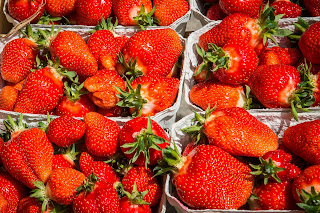Berries are delicious, and great sources of antioxidants. They are also a prime choice for farmers who want to start a pick-your-own or u-pick farm business. With so many berries to choose from, how can a small farmer choose?
It's best to pick your (first!) berry to grow on a small farm scale based on a few factors.
- First, what calls to you? What do you and your family like to eat and grow?
- What suits the conditions you have? Consider climate, topography, sun exposure, wind exposure, and soil.
- What can you afford?
- What can you market and at what price? Here's where a small farm business plan can help you immensely.
Blueberries
Blueberries are delicious and nutritious. They are one of the healthiest berries, with very high antioxidants.
If you have clay and poor, rocky soil, blueberries are your go-to berry! You will rock it. (Ha!) But, you'll need lots and lots of water--blueberries require up to an inch of water per week or more. Your ideal soil pH is acidic, at 4.0 to 4.5 so you may need to amend your soil first.
And birds love blueberries so netting may be your friend.
Strawberries
 Strawberries are pretty much your classic pick-your-own berry, right? So how can you go wrong? Well, there's a lot to consider. Will you grow June-bearing berries and have a horde of people at your farm for about, oh, two weeks? Or an everbearing variety with a longer harvest time but lower yield? Or day-neutral, which produce throughout the whole season?
Strawberries are pretty much your classic pick-your-own berry, right? So how can you go wrong? Well, there's a lot to consider. Will you grow June-bearing berries and have a horde of people at your farm for about, oh, two weeks? Or an everbearing variety with a longer harvest time but lower yield? Or day-neutral, which produce throughout the whole season?You'll need to mulch and to be aggressive to keep weeds out, but if you can do this, you'll have a great strawberry you-pick farm!
Elderberries are really easy to grow. And they are prolific once established! While they're really not at all suited for a you-pick, since they're fairly hard to pick, they do make the ideal berry for a farmer who wants to make products--value-added products--to sell.
I love making elderberry jelly, tincture, and syrup with my elderberries every fall. These products are not only delicious, but medicinal, and they command a high price from those who want quality medicinal herbal products. Plus, elderberry's color is just gorgeous, and making rivers of thick, bright fuchsia and purple syrup and jelly is just too much fun.
Raspberries are a little tougher to grow for a you-pick, given their thorny nature. But you can still grow them as a specialty item or make jellies and jams from them, and sell them at CSAs and farmers markets. Another great market is chefs and/or restaurants who might want a locally-grown, super-delicious and amazingly fresh berry to add to their menu.
Be careful: raspberry vines are invasive and love to spread!
Currants
- Currants are coming into favor as barkeeps make high-end, artisanal syrups to flavor their drinks. And they're used in baking and cooking. Make sure you have a market for these before you plant a whole bunch of them, but if you do have that market--you can have steady sales to someone who needs currants on a regular basis.They are also amazing in jams, jellies, syrups and preserves, so if that's your thing--you can have quite a nice niche making berry products and selling them at thefarmers market or even through mail order and the Internet.Currants do best in cool climates, zones 3 through 5, making them ideal for northern gardeners who might otherwise be limited. They thrive in neutral to acidic clay.
Whatever berries you pick (pick! sorry), growing them can be a fun and profitable way to have your small farm business thrive. I wish you luck!
if you want to buy Berrirs seeds, I highly recommend you purchase online through Amazon at this link:
Blueberries https://goo.gl/MSpDza
Strawberries https://goo.gl/w9gpYz
Currants https://goo.gl/9Vj411

Komentāri
Ierakstīt komentāru